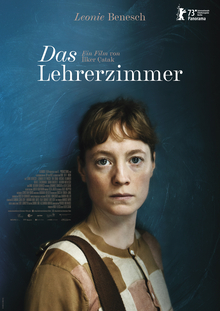This film won a ton of critical acclaim and gave my wife and I plenty to talk about afterwards, so that’s always a good sign. I suspected at first that this dealt with prejudice against immigrants in Germany but it’s so much more than that. It details the impossibly complex dynamics that teachers in first world countries must navigate in the modern world with all parties, fellow teachers, students, parents, all having a say in everything that they do. In the end director İlker Çatak doesn’t seem to lead us to any firm conclusions but it is a captivating look into the German classroom and it asks good questions.
Carla Nowak is a relatively new teacher in a school in Germany which is experiencing a spate of thefts. She becomes upset when the other teachers grill the student representatives of her class over who they suspect is responsible. Later they conduct a surprise search of the students’ belongings and find an unusually large amount of money in the wallet of Ali, a student of Turkish heritage. Ali’s parents explain that they had given him the money to buy a video game and Carla shares their outrage at being unfairly targeted. Later she witnesses a staff member casually taking change from a piggy bank meant to pay for coffee. She sets her trap by leaving her wallet in her coat in the teacher’s lounge when she leaves for the classroom but leaves her laptop’s camera on recording mode. Sure enough when she returns her money is gone. The video doesn’t capture the thief’s face but a very distinctive patterned blouse is visible. The only person wearing that blouse is Friederike Kuhn, the senior administrative assistant. When Carla confronts her, Kuhn vehemently denies being the thief and continues to do so even when the matter is escalated to the principal. Carla is further conflicted as Kuhn’s son Oskar is a student in her class and is probably the smartest one at that.
This is another one of those small films that I love so much because they manage to pack in so much in such a compact package. In this case being someone from Asia, even the straightforward portrayal of how an ordinary classroom works in modern day Germany is eye-opening and invaluable. On top of that, it layers on complex considerations about the increasing diversity of students in the country, the well-meaning educators’ desire to balance progressive values with the need to impose discipline and how in the age of social media, their every action is instantly known and disseminated by the parents. The scenes are confined entirely within the school so there’s nothing about Carla or the students’ home life but it’s a wise move to restrict the scope of the film. There’s already plenty of material as they show how the school tries to resolve its problems, how Carla has to fend off so many parties until she has a nervous breakdown and how the accusations of theft leads to bullying among the students. The acting is excellent throughout and there’s a sense of building tension as Carla’s attempt to catch the thief spins out of control.
As much as I appreciated the subject matter and the craftsmanship of this film, I don’t much care for Çatak’s reading of the situation. As he stated, he deliberately chose a younger teacher in order to have a more idealistic character. But I find myself agreeing more with the principal who says to Carla, “Trust in my greater experience.” Oskar’s intelligence shouldn’t be used to excuse his poor discipline and the school in general seems far too permissive towards the students in my eyes. The film wants to warn against careless accusations founded in prejudice. It shows how Carla’s impromptu trap led to a crisis that spiraled out of control, making her regret ever setting up the camera in the first place. Yet in the end there’s not much doubt that Kuhn really was the thief and lack of certainty surely doesn’t mean that no action at all should be taken. In pursuing artistic ambiguity in a complex situation, Çatak makes a mess of the film’s moral messaging and what the right thing to do is. I found it unsatisfying and weak. Çatak wanted to avoid the trope of a cynical, burned out teacher but why not a wiser principal who still means well and has the interests of the entire school in mind, not just one student?
I have no idea if the school shown here is at all representative of most schools in Germany but I have to say that I’m shocked by how much latitude it gives students. A student paper which is allowed to drastically misquote a teacher? A discipline board which allows student representatives to attend? I consider myself to have fairly progressive values but I can’t see how a school is even supposed to run under these conditions. I do agree that teachers are way underappreciated and underpaid in modern societies. Their jobs are more complex than ever as their mandates grow broader and broader, their every action is scrutinized under a microscope and everyone wants to have a say in education policy. It’s really great to finally have a film that confronts this dilemma.
